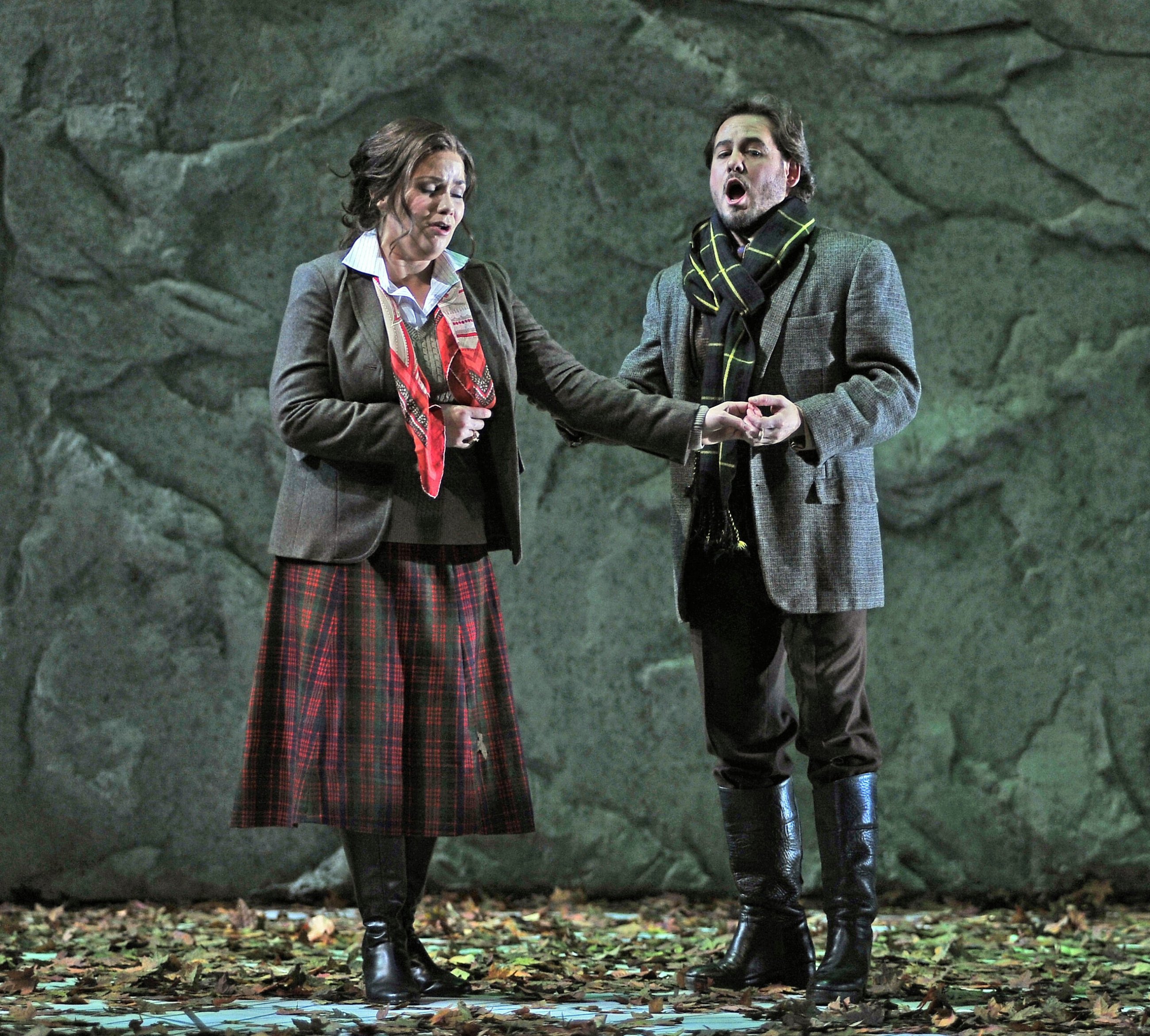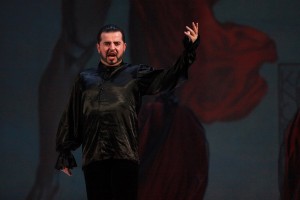
FGO, PBO Draw Energy From L.A. Industry Conference
Eglise Gutierrez and Israel Lozano in Florida Grand Opera’s 2009-10 season production of Donizetti’s Lucia di Lammermoor. (Photo by Gaston de Cardenas) Last month, representatives from two local opera companies flew to Los Angeles for a conference hosted by the New York-based service organization Opera America, where they discussed the challenges facing their companies and the art form in general.
The theme of the conference was New Realities, New Strategies, and it offered a host of sessions about the task of producing opera at a time of technological advance and harsh economic conditions. Lisa Bury, director of development for the Florida Grand Opera, gave the conference high marks.
“I’ve been to a lot of Opera America conferences, but this was the best one ever,” she said, in part because of the spirit of pulling together in tough times that she encountered among her colleagues. “I just came out of that conference being inspired.”
Bury said one of the notable sessions involved a consultant who discussed the crafting of a new business model for arts organizations, and suggested a “whole wide world of possibility” for fresh approaches that are more flexible than older methods.
“The model has to be able to deal with change,” she said.
The audience for opera, as Bury noted, has grown, gotten younger and become more diverse. One of the reasons is increased outreach, such as the Metropolitan Opera’s launching a couple years ago of live high-definition broadcasts of some operas and showing them in movie theaters.
“You now have the age-old question: Does that harm the hometown company or help them?” Bury said, adding that the Met is probably the only company in the nation with the budget to fund such an effort. But it seems to be helping the cause of opera in general.
“It’s great at building awareness of the art form,” Bury said.
Another reason is computer technology itself, which allows anyone with an Internet connection to go to a site such as YouTube and see and/or hear an astounding number of opera performances, from almost every opera house on the planet as well as any historic recording dating back to the days of Enrico Caruso.
Gezim Myshketa as the title character in Palm Beach Opera’s 2009-10 season production of Mozart’s Don Giovanni. Still, it’s a challenge trying to keep audiences coming back year after year, and trying to hang on to new members whom the company would like to see become regular operagoers. Social networking could be part of the answer. One of the featured speakers at the conference was Ceci Dadisman, a West Palm Beach-based arts publicist (and soprano) who is the e-marketing specialist for the Palm Beach Opera.
“My presentation within the scope of the conference was about integrating [social media] into the traditional marketing plan for a midsized company,” Dadisman said.
Opera companies are much more aware than they used to be about using social media, she said, and they’re starting to see its value.
“We have a lot of data coming out that shows the efficacy of social media, and that we can associate ROI [return on investment] with it,” she said. “The ROI is not necessarily in dollars – straight donations, straight sales, though that does happen – but in engaging the audience.”
Dadisman said she offered some initial guidance for companies that haven’t yet added Twitter or Facebook to their marketing arsenal.
“I did give some basic tips, but I focused more on different initiatives we’ve been able to do and how that fits in with our marketing,” she said. Palm Beach Opera’s general manager, Daniel Biaggi, has recently launched a blog, Biaggi Says, that will add to the image-making of the company, which turns 50 next year.
FGO plans four operas for its 70th season, starting with Puccini’s Turandot, then Offenbach’s The Tales of Hoffmann, both the final operas by their creators, and both left unfinished at their deaths in 1924 and 1880, respectively. Mozart’s Don Giovanni follows, and the season ends with Cyrano, an opera by American composer David DiChiera based on the Edmond Rostand play about Cyrano de Bergerac that premiered in Detroit in 2007.
Palm Beach Opera’s season begins with Verdi’s Nabucco, followed by two semi-staged performances of Gluck’s Orfeo ed Euridice. Next up is Mozart’s Così fan Tutte, completing the trilogy of Mozart-Lorenzo Da Ponte collaborations that saw PBO mount Le Nozze di Figaro and Don Giovanni in the past two seasons. The company’s season closes with Puccini’s Tosca.
The production challenges ahead are great, but opera itself remains uniquely powerful, Bury said. “Opera is the pulling together of so many art forms. You can see dance, you can see drama, you hear vocal singing, you hear instrumental music,” Bury said. “You really get your bang for the buck when you go to the opera … I think we have a great product, and I came out of the conference really energized about making the case that we play an important role in society.”
Recent Content
-
Artsarticle ·
-
Artsarticle ·
-
Artsarticle ·

